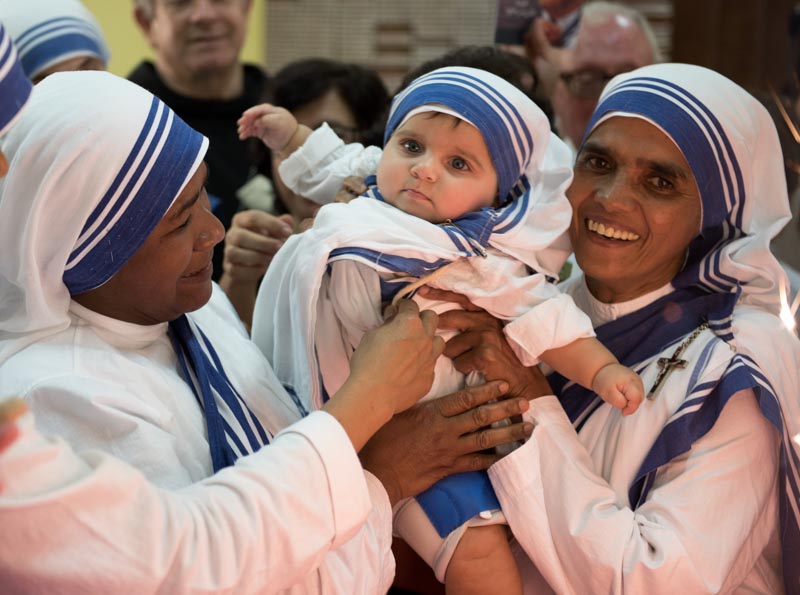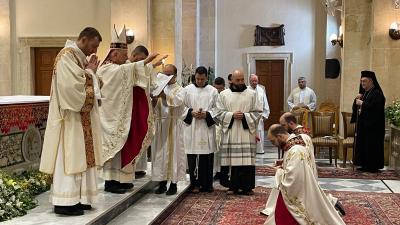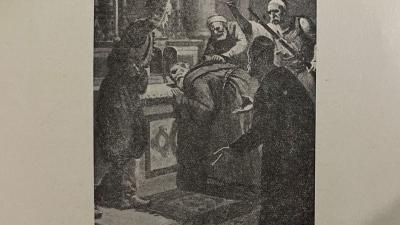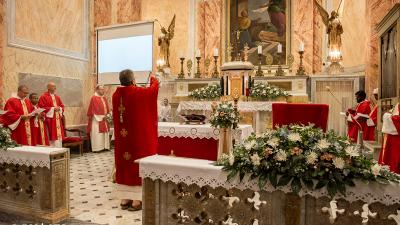
On Sunday, September 18, the Christian community, along with the Missionary Sisters of Charity present in Palestine and Jerusalem, gathered at St. Savior's for a mass of thanksgiving on the occasion of the canonization of their foundress St. Teresa of Calcutta, who was celebrated in Rome on September 4.
Mons. Bishop Shomali, auxiliary bishop, presided over the celebration, alongside the Father Custos Francesco Patton and fifteen priests, whereas the nuns who came from Bethlehem and Gaza sat with their sisters from Jerusalem in the first row, a place that is rare for them to take.
The sisters of Mother Teresa, as they are commonly called, have been painting the landscape of the Holy Land with their white saris with a blue trim for over 40 years. Always going two by two, they go from one house to another so as to discreetly help with all forms of poverty. Now it may be a family that has nothing to eat; later it might be a sick person who cannot move.
Many are Indian, and some from other countries, and they all try to learn a few words in Arabic in order to be understood at people's houses, but their charity often enough. Certain words often come out of their mouths: God, mass, confession, communion, prayer. Basically, [these words] constitute the essential part of the Gospel message that the sisters bring when giving someone an orange or some medicine.
In his homily, Mons. Shomali recalled the holy pilgrimage of Teresa of Calcutta in 1982. He was a student at the seminary in Beit Jala and Mother Teresa was awarded the Nobel Peace Prize. “We asked her to talk about her congregation and its activities, but she spoke only to us about why she took care of the poor and fought against poverty. And the reason was her love for Jesus, the poorest of the poor.”
“We will be judged on love, is a reminder from the reading of the Gospel of Matthew” (Matthew 25: 30,46), for the feast, the homilist continued. “St. Teresa lived out this love for all of her life, and she gathered all of the poor she met on the streets of Calcutta, irrespective of their religion so as to give them a place to live in the centers she created. In them, she saw Jesus. And God's hand provided what was needed. Let us also work as she did. Let us love the members of our family, let us love our neighbors, visit the sick, and give what we have to the poor.” After the celebration, the parish welcomed the congregatin on its premises so as to thank the Missionary Sisters of Charity for their example.
On the same day in Nablus a celebration with the Missionary Fathers of Charity, a contemplative branch of the order, also took place.
There are 40 Missionary Sisters of Charity in the Holy Land (Palestine, Jerusalem and Jordan) in seven households.
In some households, they accommodate people with disabilities or the elderly, while in others they do not run welcome centers but rather reach out to the poor where they can find them. For the [religious] community that is present in this land, the Jerusalem house is a place of spiritual renewal for the religious themselves.




